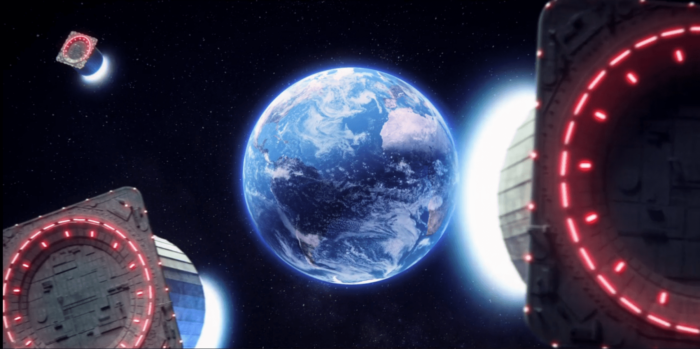Content warning: Emotional Abuse
Bear with me on this one: “When Yogurt Took Over”—a story about sentient yogurt turning the world into a utopia then leaving—is an effective metaphor for abusive relationships and the anxiety of them ending.
Originally a short story written by John Scalzi, the Love, Death & Robots adaptation follows the narrative to an almost perfect T. It’s the tale of yogurt gaining sentience, then leveraging that sentience against the United States government to gain control of Ohio, then the entirety of the world before leaving for the stars. A clear analogy for abusive relationships, right? Maybe not. Let’s start from the end and work back.
The final moments of the story see the yogurt fly to the sky in rocket ships (shaped like yogurt cups, naturally). The humans of the utopia the yogurt has created are left behind, and they begin to wonder what happens if they are left alone forever. The yogurt has created this world, can they be trusted to maintain it, to see it continue to thrive in the way it currently is? The yogurt left and took our autonomy with it.

The world only got to this point because of the yogurt. Humans relinquished the power to govern when we caused a global economic collapse. The yogurt handed us a plan to solve everything, but we messed it up. We thought we knew better. Or maybe the yogurt knew we didn’t.
The yogurt gave the plan to the United States with a thinly veiled threat. It wanted Ohio, and if the government wouldn’t give the state to the yogurt, it would take its plan to China. The yogurt was going to get what it wanted.
The yogurt started out as an experiment, one thought to be a failure. They believed the yogurt didn’t gain sentience. They believed the yogurt was healthy and harmless.
Obviously, the idea of yogurt being the cause of an abusive relationship is silly. So, let’s remove the yogurt from the equation and consider two hypothetical people. Meet Jamie and Taylor. Jamie decides that they have a goal—fame. Taylor has the connections to get Jamie their goal, but Taylor isn’t where Jamie needs to them to be, metaphorically speaking. So, Jamie offers to help Taylor. Jamie supports Taylor’s growth, but all the while consolidates power. Jamie removes Taylor’s autonomy. Then, when Taylor can no longer grow any further, Jamie uses Taylor as a springboard and abandons them, launching themselves higher. Meanwhile Taylor, left feeling powerless and dependent, succumbs to anxiety and fear.
Jamie, meet Taylor.The yogurt has a goal—space. Humanity has the resources to get the yogurt to space, but humanity isn’t where the yogurt needs them to be, technologically speaking. So, the yogurt offers to help humanity. The yogurt helps humanity grow, but all the while consolidates power. The yogurt removes humanity’s autonomy. Then, when humanity can no longer grow any further, the yogurt uses humanity as a springboard and abandons them, launching themselves into space. Meanwhile, humanity, left feeling powerless and dependent, succumbs to anxiety and fear.
With the story reduced to its barest terms, the undercurrent of abuse starts to take form. Revisiting the course of events, chronologically this time, with a focus on abuse, solidifies the metaphor.
The yogurt awakes to sentience. It declares that it is has solved fusion, and then requests that it be taken to humanity’s leaders. Upon arriving, it offers to help the United States pull out of its debt crisis. But not for free. It will help them, but they must offer something in return. And if they refuse, they can go to someone else. They can go to China.
The easiest reference point is to business meetings. The yogurt has something the United States wants, and if the U.S. won’t pay for it, the yogurt will take it elsewhere. However, this mentality can also be seen in the infancy of relationships. Relationships, much like businesses, are built on trust and mutual growth. Partners work together to achieve their goals, but if one feels that the relationship is not working, they will leave. This is the unspoken contract of every relationship.
When the threat of leaving is verbalized, however, it takes on a far more insidious tone. It becomes a threat, reminding the partner that the abuser has other options. That the abuser could leave at any time, and that the partner should be thankful that they’re still partners.
The United States accepts the proposition, with a warning from they yogurt that they must not deviate from the plan at all. This is sinister as well, as this can be read as assuming control. The yogurt knows best, and to disobey would be a disaster. But beyond that lies a worse motive.
“…But we still ask ourselves: If the yogurt was smart enough to solve our debt problem, wasn’t it also smart enough to realize that human intellectual vanity would keep us from following the form exactly?”
Gaslighting is when an abuser forces an individual to question their sanity, to wonder at the underlying motives of their partner. The yogurt utilized this technique, playing humanity against itself. It knew that humanity would fail, and when it did, the yogurt would be there to solve everything, provided humanity gave itself to the yogurt. Humanity would never need to worry about its own hubris again. Humanity signed away its free will to govern, giving the yogurt complete control. As long as humanity served the yogurt’s motives, everyone was happy. Humanity was completely codependent.

Then the yogurt left. It left without warning, after stripping humanity of all of its self-reliance. Humanity is left as a shell of itself, unable to function.
“What happens if [the yogurt] goes, and leaves us behind forever?”
Anxiety kicks in. Humanity lost their partner, the being they relied on to survive. They’ve been robbed of their autonomy and identity. How will they function? What will happen? This is the question of a lot of abuse victims, and the reason a number stay with their partners. They’ve been stripped of their power and so they feel as though they cannot function without their partner guiding their life.
Of course, the whole abuse metaphor is still mired in the idea that it stems from yogurt, which makes the entirety of it seem ridiculous. Except that’s how abuse starts. Your partner is perfect, unsuspecting. Its ridiculous, laughable even, that they would want to hurt you.They seem harmless and supportive. They’ve helped you solve problems, resolve conflicts. They’re yogurt. Healthy and harmless.
Until they’re not.

